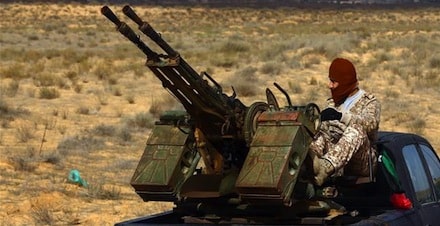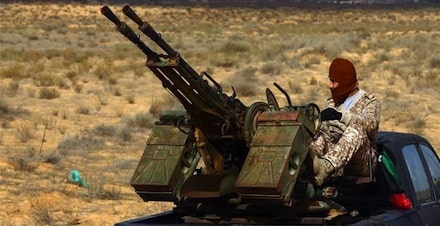Responsibility for the killing of at least two EU citizens in an air raid on the port of Derna on 5th January has been admitted by the EU-backed Libyan government based in the eastern Libyan port of Tobruk.[1] The bombing is the latest sign that violence in Libya is spiralling out of control. With two rival governments and at least 30 local militias fighting for control over the country’s energy resources and lucrative people smuggling rackets, the European Union is paralysed by the legacy of its backing for the NATO intervention against Colonel Gaddafi’s regime in 2011. Apart from the French President, the other EU leaders have hidden their heads in the sand and refused to comment. President Hollande, however, popped up only to insist France will not re-intervene in Libya.
Between 2004 and 2010, relations between the West and Gaddafi’s Libya had improved after years of sanctions following the downing of the Pan-Am 747 over Lockerbie in December, 1988. Gaddafi supplied oil and gas to the EU, not least the old colonial power, Italy, and his regime also cracked down on people smuggling which had imposed a huge burden on Italy in particular as the nearest EU destination for thousands of African migrants.
But the so-called Arab Spring chilled EU-Libyan relations dramatically. Within days of protests beginning, the EU governments which had previously courted the Colonel reverted to denouncing him as a terrorist and genocidal killer.
It was Colonel Gaddafi’s threat to use his air force against the uprising in eastern Libyan cities in early 2011 which was used to justify NATO’s imposition of a No Fly Zone over the whole of the North African country from mid-March, 2011. The UN Security Council authorised what became in effect an air campaign to back a rebellion against the 42 year-long rule of Gaddafi. But since his overthrow and murder in October, 2011, the NATO states have switched off their concern about human rights and the threat of aerial bombardment of civilian centres in Libya even though internecine violence has continued there.
In recent months, the scale of fighting between militias has intensified. The former CIA-backed ex-Gaddafi General Haftar has proclaimed himself the leader of an anti-Islamist campaign to cleanse Libya of al-Qaeda-style extremists. Since the US ambassador, Chris Stevens, was murdered in September, 2012, in Benghazi by such extremists, who until then had been seen as useful volunteer fighters for the US-backed struggle against Syria’s President Assad, Washington has swung to supporting Libyan militias opposed to fundamentalists – even though in practice all the groups claim to adhere to strict Islamic criteria (and had denounced Gaddafi for not being Muslim enough).
Tens of thousands of Libyans were killed in the eight month war to overthrow Gaddafi, but at least as many have died violently since then. Since July, 2014, the scale of the fighting has intensified. The Western-backed government lost control of the capital, Tripoli, soon after the election in June, 2014, which supposedly gave it democratic legitimacy. It fled to the eastern port of Tobruk to try to keep control of as much of Libya’s energy exports as possible, but its members are based on a car ferry in the port so they can make a quick getaway of the strategic situation worsens.
If the EU states have stayed aloof from the fighting ripping Libya apart since their intervention in 2011, other states have been less restrained. Egypt and the Gulf members of the UAE have provided resources including air power to back up the Western-backed Tobruk government. Planes from these Arab states as well as a few old Gaddafi MiGs controlled by Haftar have periodically bombed civilian centres from Benghazi to Tripoli and Misrata claiming to target Islamist fighters, but frequently killing civilians. Until the bombing of the Greek tanker in Derna on 5th January, the EU states who boiled with fury at Gaddafi’s mere threats to use air power against rebellious Libyans have been silent about the repeated random air raids launched on behalf of the “internationally-recognised” government in Tobruk.
It has been claimed that Qatar and Turkey back the unrecognised government in Tripoli. If so their support is largely rhetorical. Turkey’s President Erdogan decries the military regime in Egypt which overthrew his “Muslim Brother”, President Morsi in 2013. Until the last few weeks Qatar and Cairo were in a state of cold war, but maybe the Emir in Doha and Field Marshal-President Sisi are about to kiss and make up. Qatar has shut the “independent” Al Jazeera satellite channel reporting on Egypt which had carried anti-Sisi propaganda and the courts in Cairo have ordered a re-trial of three journalists from the Al Jazeera English-language service previously convicted of backing the “terrorist” Morsi government.
But for Libya the problem is that however much external military intervention by NATO and the Gulf States precipitated the country’s current crisis by imploding the Gaddafi regime without promoting a legitimate successor, external intervention is unlikely to resolve the internal conflicts now. Even if NATO reimposed its No Fly Zone, at best that would halt the desultory misguided bombing of civilian areas, but even though these air raids have costs hundreds of lives, thousands more have been killed by fighting between militias on the ground. Energy prices on the world markets may have fallen and Libya’s exports almost dried up, but for thousands of young men with AK47s and rocket-launchers fighting to control oil fields, pipelines and terminals makes sense as an investment in their future – if they have one at all. Sooner or later the Western world will come knocking as it did on Gaddafi’s door when oil prices rose after 2003.
Many of the local warlords cut their teeth in jihadi fighting sponsored by Western intelligence agencies from Afghanistan to the anti-Gaddafi uprisings in the years after Lockerbie. Back channels to Western intelligence agencies like MI6 and the CIA have a long history and could be reactivated when the price is right.
Meanwhile washing their hands of Libya has been the response of EU leaders. They have added crocodile tears about the five thousand or so migrants drowned trying to cross the Mediterranean from chaotic Libya, but refuse to admit that their policies since 2011 have made the bad situation of the country under Gadafi’s rule infinitely worse.
Maybe the killing of a Greek and a Romanian on an EU tanker will wake Brussels up to its share of the responsibility for the mayhem on the southern side of the Mediterranean, but on past form nothing will be done.
[1] http://www.dw.de/libyan-government-admits-to-bombing-greek-owned-tanker/a-18170940
Reprinted with author’s permission from CRIOXBlog.


